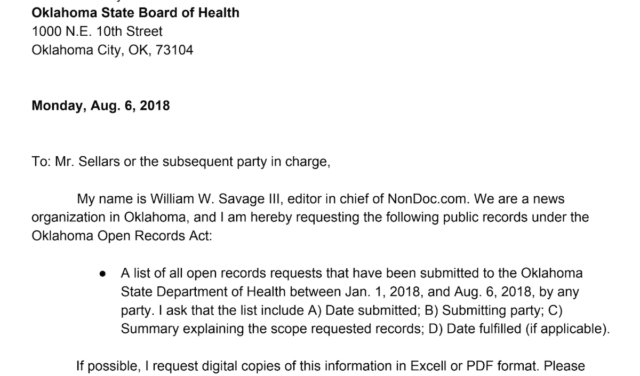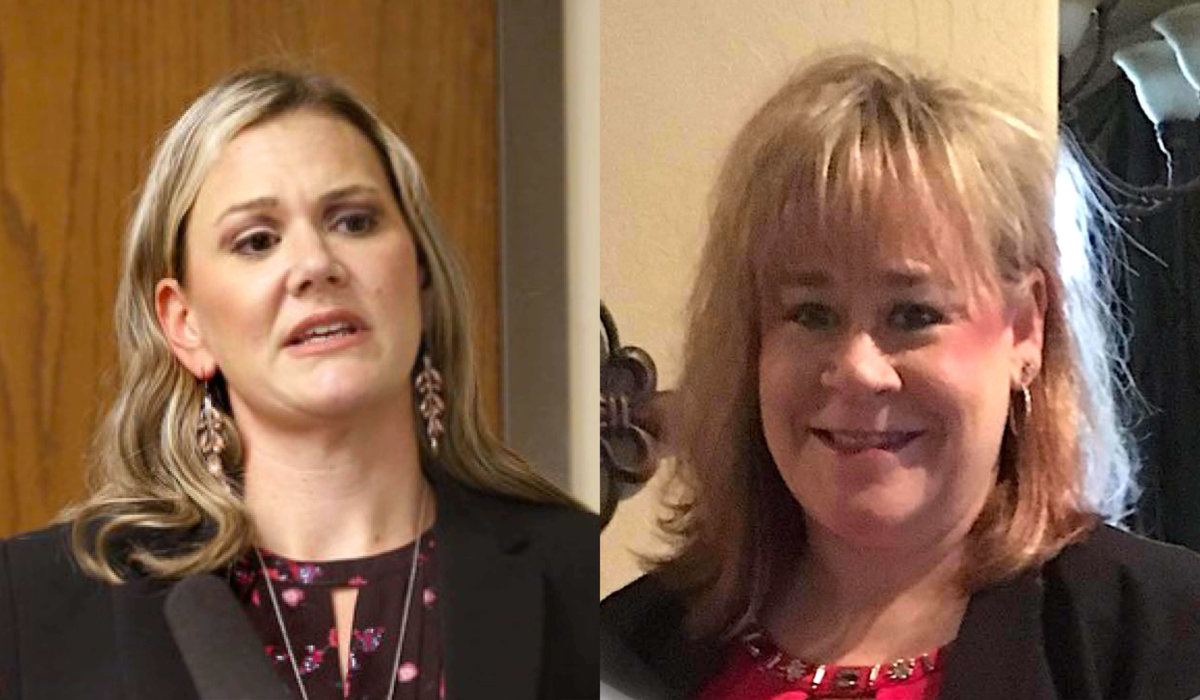The Oklahoma State Department of Health has found itself the subject of numerous negative headlines in the past year, so perhaps one more will not trouble state leaders.
But legislators, members of the public and gubernatorial candidates should be concerned by the department’s apparent lack of urgency in responding to open records requests, even as citizens try to understand what occurred in that dreary tower on N.E. 10th Street lo’ these many months.
While the embattled agency has not provided records in response to our July 16 request about the Board of Health’s early-July medical marijuana antics, conversations with other media indicate the agency has failed to fulfill requests submitted as long as 11 months ago.
With the department’s recent track record, Commissioner of Health Tom Bates would do well to pledge transparency to the public and expedite a slate of pending open records requests before him. If additional legal assistance becomes necessary to complete the requests, he should seek staff assistance from Attorney General Mike Hunter’s office.
‘Quite a few’ open records requests unaddressed
Bates, of course, should understand the legal obligations facing his agency and his ability to request interagency help. A former assistant attorney general, he took the helm of a wobbly barge in late March, three months before voters passed State Question 788 to legalize medical marijuana.
Some legislators praised Bates for OSDH’s preparation to establish the Oklahoma Medical Marijuana Authority, and as health officials lumbered toward a July 10 Board of Health vote on proposed rules, the agency appeared poised to earn a much-needed “win.”
RELATED
Pushing marijuana rule, Board of Pharmacy director offered attorney a job by William W. Savage III
That is not what happened.
Instead, the Board of Health amended the marijuana rules in a manner Hunter said “overstepped its authority.” The events surrounding the board’s action have been described as unprecedented, and journalists have been digging into the matter, even after the board reversed course Aug. 1.
Meanwhile, the agency’s legal counsel, Julie Ezell, resigned after admitting she fabricated digital threats against herself. Then, Ezell was revealed to have been offered the “guarantee” of higher compensation at the Board of Pharmacy if she made rule changes requested by then-Board of Pharmacy Director Chelsea Church. (Ezell did not do as Church requested, but the Board of Health initially did before lawsuits and public outrage forced them to backtrack.)
The fiasco spurred the submission of “quite a few” open records requests to the agency, according to Tony Sellars, OSDH communications director, during a July 24 interview.
“We got a lot of them that are kind of similar. Somebody might be more detailed and some less, but they contain elements of basically the same stuff,” Sellars said. “So they’re trying to go at the most extensive one and then see how that meets the other requests we got and try to get one fell swoop. (…) We are trying to turn them around and obviously get work done and meet deadlines that we have to meet on other issues at the same time. But we’d like to get all this out the door as soon as possible.”
While Sellars was responding to questions about our records requests dated July 16, conversations with other media indicate OSDH appears to have other pending requests for controversial public information dating back even further.
Journalists with The Frontier confirmed they are waiting on documents from a records request submitted in October 2017, long before the medical marijuana proceedings. At the time, media were attempting to sort out how the agency had found itself on the brink of shocking financial insolvency that drew investigations from state and federal law enforcement.
As to how many open records requests constitute the “quite a few” OSDH says it received in July, that also remains unclear. On Aug. 6, we filed a subsequent request with the agency for a list of all open records requests submitted to OSDH beginning Jan. 1 of this year, and we requested information about the status of each.
More than a month later, that request has not been filled either, nor has our July 16 request with the Oklahoma Board of Pharmacy, though they did say on Aug. 27 that they had requested assistance from the Office of Management and Enterprise Services to search emails.
Reached Sunday, Sellars noted that OSDH intends to release “five” record-request results “this week,” a feat he said would make “44 of 61 fulfilled,” though it was unclear over what timeframe the statistic applies. He also said The Frontier’s request features more than “5,000 emails.”
Health Department making its own bed
While it might seem like media seeking timely access to open records unfairly place a burden on agency staff, those involved should remember that the open records requests filed about OSDH’s medical marijuana drama would not exist if not for the drama itself. The same can be said for requests about OSDH’s financial troubles.
To that end, we hope the public, lawmakers and gubernatorial hopefuls understand why delayed responses to open records requests are a problem.
Delays not only symbolize the apparent dysfunction of state systems, but they back up cynical arguments that state employees do not deserve pay raises or that agencies are bad stewards of public finances and resources. Even worse, people begin questioning the ethical intentions of such state agencies. Are they stalling? How do these requests take weeks or months to fulfill when other agencies achieve transparency in mere days?
Such questions seem endless. If the Oklahoma State Department of Health cannot provide timely accounting of its own documents and mull through its own emails in order to meet legal obligations, why should lawmakers appropriate additional funding to expand programs? Why should the public accept tax increases to support those agencies? Why should people in charge now be retained under a new gubernatorial administration?
We hope legislators from both parties will begin their week by inquiring about the Oklahoma State Department of Health’s open records request statistics.























